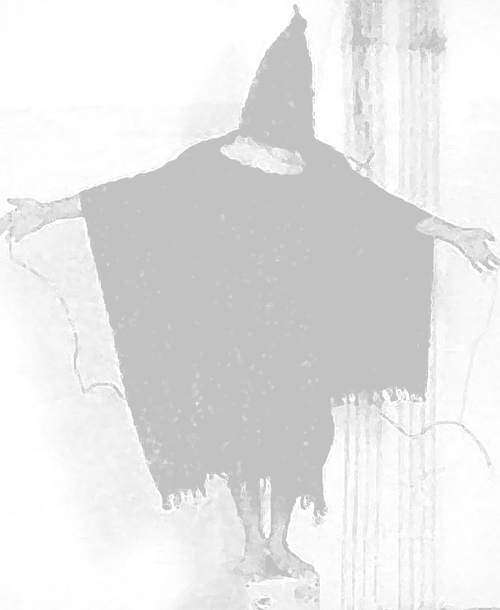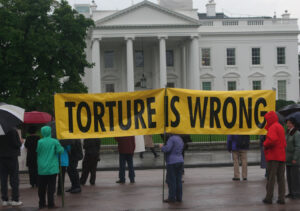11 years of American Shame and Dishonor
100 days today — May 17 — marks a new and grievous low point in an unfolding tragedy begun in early February at the Guantánamo Bay military facility and detention center. At that time a hunger strike was initiated by some of the prisoners. Now it is estimated that more than 100 of the 166 detainees are participating in the strike.
Dozens are being force fed against their will, a practice described as violating “core ethical values of the medical profession” by the president of American Medical Association Dr. Jeremy A. Lazarus in a letter to Defense Secretary Chuck Hagel. At a hearing in March at the Inter-American Commission on Human Rights attorneys and physicians testified that the situation in Guantánamo is a “humanitarian crisis.”
 All of this comes in the midst of a much more sweeping and damning report released on April 16 by The Constitution Project on the use of torture as a part of military and intelligence policy in the post-9/11 years. The two-year blue-ribbon, bi-partisan, independent investigation concluded that, “It is indisputable that the United States engaged in the practice of torture.” The 11-member commission, whose members came from government, military, and law enforcement, was chaired by two esteemed former congresspersons: Republican Asa Hutchinson of Arkansas and former member of the Bush administration serving as an Under Secretary in the Department of Homeland Security; and Democrat James Jones of Oklahoma, a former member of the Lyndon Johnson’s administration, currently US ambassador to Mexico. The 577-page report paints a scathing picture of the widespread use of torture in Guantánamo, Afghanistan, Iraq, and at secret CIA “black prisons.”
All of this comes in the midst of a much more sweeping and damning report released on April 16 by The Constitution Project on the use of torture as a part of military and intelligence policy in the post-9/11 years. The two-year blue-ribbon, bi-partisan, independent investigation concluded that, “It is indisputable that the United States engaged in the practice of torture.” The 11-member commission, whose members came from government, military, and law enforcement, was chaired by two esteemed former congresspersons: Republican Asa Hutchinson of Arkansas and former member of the Bush administration serving as an Under Secretary in the Department of Homeland Security; and Democrat James Jones of Oklahoma, a former member of the Lyndon Johnson’s administration, currently US ambassador to Mexico. The 577-page report paints a scathing picture of the widespread use of torture in Guantánamo, Afghanistan, Iraq, and at secret CIA “black prisons.”
The commission reported that never before in our history has there been “the kind of considered and detailed discussions that occurred after 9/11 directly involving a president and his top advisers on the wisdom, propriety, and legality of inflicting pain and torment on some detainees in our custody.” The Bush Administration engaged in elaborate means to justify and conceal its widespread use of torture and abuse of people suspected of terrorism. The panel claimed that, “the nation’s highest officials bear some responsibility for allowing and contributing to the spread of torture.”
And though the focus of that study was on the Bush Administration in the not-so-distant past, the commission also criticizes the Obama Administration for continuing the misguided policies of secrecy and calls on it to declassify many of the documents regarding past imprisonment and torture of detainees, observing that “ongoing classification of these practices serves only to conceal evidence of wrongdoing and makes its repetition more likely.” It urges our leaders, regardless of political affiliation, to publicly acknowledge that the use of torture and cruelty was a grave mistake and take steps to ensure it cannot be repeated. Indeed, heretofore the Obama Administration has resolutely refused to empanel such an official study and to declassify over 6000 pages of documentation.
___________________________________________
Remember the unfolding crisis in Guantánamo in your prayers and worship services this weekend. Lift up all people, prisoners and captors, our policy-makers and leaders, as we seek to follow the One who calls us to a bold peace, a just peace, and a peace in which there is no harm done on God’s Holy Mountain.
___________________________________________
The Constitution Project’s commission corroborated countless studies and testimonies from within the military establishment and outside of it: torture does not work. The report states that “no firm or persuasive evidence that the widespread use of harsh interrogation techniques by U.S. forces produced significant information of value.” Rather it creates the conditions for misinformation, non-cooperation from potentially sympathetic communities, fear, and enmity.
Torture. The very word makes us recoil, for it holds the very worst of our range of possible behaviors towards another human being. It marks the antithesis to any aspiration for dignity and integrity we might hold and toward which we seek to live. In 1994 the United States ratified the Convention Against Torture and Other Cruel, Inhuman or Degrading Treatment or Punishment and declared torture illegal. In a report to the United Nations in 1998 we wrote: “Torture is prohibited by law throughout the United States. It is categorically denounced as a matter of policy and as a tool of state authority. Every act constituting torture under the Convention constitutes a criminal offense under the law of the United States. No official of the Government, federal, state or local, civilian or military, is authorized to commit or to instruct anyone else to commit torture. Nor may any official condone or tolerate torture in any form. No exceptional circumstances may be invoked as a justification of torture 1.” May our actions and policies match our laws.
 The Presbyterian Church (USA) has been clear and consistent in its opposition to torture. In 1978, the General Assembly of the PCUS declared that “no human agency has the right to own, manipulate, brainwash, torture, physically eliminate, experiment with, or deny the existence of any human being.” In 2004, the 216th General Assembly voted to “explicitly reject torture and abuse as methods of interrogation and treatment of prisoners for they are inconsistent with the Gospel.” A Resolution Against Torture: Human Rights in a Time of Terrorism, a policy paper of the 217th General Assembly (2006), recognized that “. . . the purpose of torture is not actually to extract intelligence but to break the sense of self; it is a form of intimate, humiliating terror, a crime against the human spirit and God’s image in us.”
The Presbyterian Church (USA) has been clear and consistent in its opposition to torture. In 1978, the General Assembly of the PCUS declared that “no human agency has the right to own, manipulate, brainwash, torture, physically eliminate, experiment with, or deny the existence of any human being.” In 2004, the 216th General Assembly voted to “explicitly reject torture and abuse as methods of interrogation and treatment of prisoners for they are inconsistent with the Gospel.” A Resolution Against Torture: Human Rights in a Time of Terrorism, a policy paper of the 217th General Assembly (2006), recognized that “. . . the purpose of torture is not actually to extract intelligence but to break the sense of self; it is a form of intimate, humiliating terror, a crime against the human spirit and God’s image in us.”
As followers of the One who himself was a victim of torture, we have an immediate opportunity to advocate both for the abolition of torture as well as for the closing of Guantánamo Bay. This was one of President Obama’s campaign pledges in 2008: to close the Guantánamo prison. Though stifled by a fear-mongering or fearful — take your pick — Congress, the President does have the authority to move detainees out.
166 prisoners have been held indefinitely; many have been held without any due process; all have been physically and psychologically and spiritually ravaged. We are breeding nothing but hate and enmity. President Obama must be urged to exercise his authority to review these cases, to order transfers out of Guantánamo, to move the process to the desired end of shutting “Gitmo” down.
Today is day 100. Remember the unfolding crisis in Guantánamo in your prayers and worship services this weekend. Lift up all people, prisoners and captors, our policy-makers and leaders, as we seek to follow the One who calls us to a bold peace, a just peace, and a peace in which there is no harm done on God’s Holy Mountain.
Contact your legislators and our President. Consider approaching your local newspaper with your own op-ed or letter. May there not be a 101st day.
Notes:
For further information on Guantánamo hunger strike:
- Richard Killmer, Executive Director of the National Religious Campaign Against Torture (NRCAT).
- On May 10, NRCAT cosponsored a Congressional briefing on why it is imperative that we close Guantánamo.
- NY Times article by Charlie Savage on Guantánamo.
- AMA President Dr. Jeremy A. Lazarus letter to Hagel — letter to Defense Secretary Chuck Hagel
- NY Times op-ed by a Guantánamo detainee translated from an unclassified phone call with attorney.
For further information on Constitution Project:
US Ratification of Convention Against Torture:
About the author:
 Rev. Philip Lloyd-Sidle
Rev. Philip Lloyd-Sidle
Pastor, James Lees Memorial Presbyterian Church
Louisville, KY
Phil Lloyd-Sidle is pastor of the James Lees Presbyterian Church in Louisville, KY, and a former mission co-worker in Uruguay during the dictatorship. He also leads Sowers of Justice, an organization devoted to social transformation projects and solidarity education in Louisville.









GUANTANAMO AND BEYOND. 1011. Rigging the rules to make it easier for tribunals at Guantanamo to conclude that people are terrorists paradoxically makes